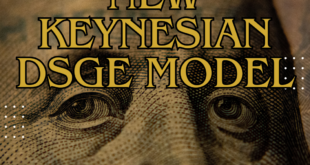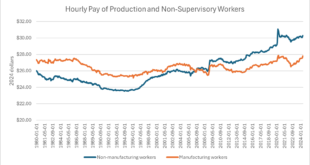from Peter Radford Price-gouging is now a topic in politics. Kamala Harris has put it there. Naturally there has been the predictable outcry of opposition coupled with and equally predictable sneer of disapproval: how could she say something so uneducated? Has she no grasp of Econ.101? Oh the illiteracy! Perhaps even more predictable is that someone like John Cochrane has felt it necessary to write an article in praise of price-gouging. After all, hard core libertarian economists are...
Read More »The crisis of knowledge and enlightenment’s imitations
from Asad Zaman and current issue of RWER Our current environmental predicament is fundamentally a crisis of knowledge, rooted in the Enlightenment’s narrow conceptualization of epistemology. This shift fostered an illusion of objectivity that has since permeated our understanding of the world, particularly in the context of societal dynamics. The Enlightenment’s emphasis on objective knowledge marginalized the subjective realms of emotional intelligence, moral intuition, and diverse...
Read More »“New Keynesian” DSGE models
from Lars Syll To be fair to academia, it has realized that the pure DSGE model is incapable of explaining observable phenomena so they have introduced numerous amendments, known, oddly, as “imperfections” in the model. Long-term nominal contracts, other labour market frictions, imperfection in credit markets, all these and more are prayed in aid and, either rigorously or more usually ad hoc, introduced into the model, generating lags that mean it can be represented as fitting the data....
Read More »Amazon blocks advertising of a novel whose narrator is an economist
from Edward Fullbrook A few years ago, I wrote a novel that was published under a pen name and titled Two American Dreams; Which is yours? Recently its publisher realized that, although set in the Sixties (mostly in Berkeley) this novel pertains to the coming US presidential election to a remarkable degree. With that in mind, they submitted to Amazon a standard advertisement for the novel in both its paper and Kindle formats. Amazon says that such adverts are usually...
Read More »“New Keynesian” DSGE models
from Lars Syll To be fair to academia, it has realized that the pure DSGE model is incapable of explaining observable phenomena so they have introduced numerous amendments, known, oddly, as “imperfections” in the model. Long-term nominal contracts, other labour market frictions, imperfection in credit markets, all these and more are prayed in aid and, either rigorously or more usually ad hoc, introduced into the model, generating lags that mean it can be represented as fitting the data....
Read More »Manufacturing jobs: unions made them good, not the factories
from Dean Baker The effort to bring back manufacturing jobs has been a major theme in the 2024 election. Both parties say they consider this a high priority for the next administration. However, there is a notable difference in that the Biden-Harris administration has actively supported an increase in unionization, while the Republicans have indicated, at best, neutrality if not outright hostility towards unions. This distinction is important in the context of manufacturing jobs. Many...
Read More »Deirdre McCloskey’s shallow and misleading rhetoric
from Lars Syll This is not new to most of you of course. You are already steeped in McCloskey’s Rhetoric. Or you ought to be. After all economists are simply telling stories about the economy. Sometimes we are taken in. Sometimes we are not. Unfortunately McCloskey herself gets a little too caught up in her stories. As in her explanation as to how she can be both a feminist and a free market economist: “The market is the great liberator of women; it has not been the state, which is after...
Read More »A review of Dan Davies’ book
from Peter Radford – a critique of the absurdity of economics I finally read “The Accountability Machine”, the book by Dan Davies. It’s worth the effort. You can read it in a number of ways. As a peon to cybernetics and Stafford Beer. As a critique of the absurdity of economics. As a summary of the development of management theory. Or as a summary of the ills of neoliberalism. It’s a mash-up of all those. It also has the great virtue of being very readable. Chapter Six will warm...
Read More »Paul Davidson (1930-2024) In Memoriam
from Lars Syll Paul Davidson, the co-founder of the Journal of Post Keynesian Economics (JPKE) and a leading Post Keynesian economist, died on June 20, 2024, in Chicago. He was born in Brooklyn, NY, on October 23, 1930, about a year after the Great Crash of 1929. He was a staunch defender of the importance of John Maynard Keynes, whose ideas, he insisted, differed fundamentally from those of the Neo-Keynesians who came to dominate American macroeconomics after World War II. He viewed...
Read More »Hudson on Super Imperialism 2
from Asad Zaman and WEA Pedagogy Blog This is the second post in a sequence explaining post WW2 USA strategies for global dominance. For the previous post, see: Hudson on Super Imperialism 1 U.S. Financial Strategies for Global Dominance Introduction: Michael Hudson, in his podcast and writings, provides a profound critique of the U.S.’s economic and financial strategies that have underpinned its global dominance. This blog post explores Hudson’s insights into the...
Read More » Real-World Economics Review
Real-World Economics Review




